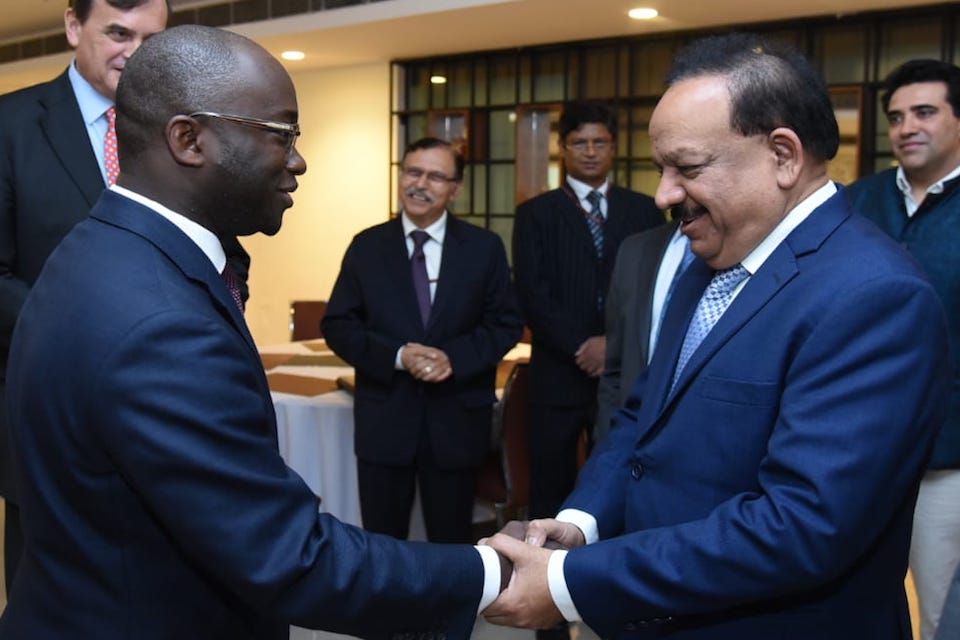UK Science Minister Sam Gyimah and Indian Minister for Science and Technology, Dr Harsh Vardhan today celebrated their joint ambition to tackle global challenges, through announcing another wave of UK-India research projects.
The UK and India are committed partners in the fight to transform lives through research and modern technology. To reinforce that cooperation, UK Minister of State for Universities, Science, Research and Innovation, Sam Gyimah and Indian Minister for Science and Technology, Dr Harsh Vardhan today (Thursday 26 July) co-chaired the biennial Science and Innovation Council meeting in New Delhi.
During the Council meeting, the ministers celebrated the human impact that existing cooperation through the 600 projects supported by the Newton-Bhabha Partnership had brought, such as using technology to monitor maternal health and make water safe.
They reinforced their desire to use science and innovation to address some of the biggest challenges facing society - for example the threat of climate change, food security and energy consumption – and to harness the opportunities brought by technological advancements.
They signalled their commitment to a deeper relationship by jointly announcing four new awards worth £4.8 million under the Civil Nuclear Energy programme and seven new awards worth £10.8 million under Phase 2 of the Global research programme on health. They also renewed a Memorandum of Understanding focusing on environmental challenges and another on arts and humanities.
Speaking from Delhi, UK Science Minister Sam Gyimah said:
“The UK believes in the power of research and development to tackle global challenges and improve people’s lives for the better. India is the fastest rising research and innovation power in the world, and so I’m excited by the huge potential for enhanced collaboration as we support high-quality, high-impact research that changes lives.”
“Today’s Science and Innovation Council meeting has reinforced our strong relationship, and the announcements we have jointly made today will ensure that cooperation continues to go from strength to strength.”
The ministers also applauded India’s growing science capability and innovation-focused science policy approach. They reinforced their commitment to the India-UK Technology Partnership – announced by PMs Modi and May in April – which brings together the UK’s Modern Industrial Strategy and India’s core science and innovation initiatives.
Indian Minister for Science and Technology, Dr Harsh Vardhan said:
“Technology Cooperation is the key to the future. India and the UK should work on sustainable, affordable, and low energy consumption technologies"
The Council was created to strengthen the two countries’ science, technology and innovation relationship. This year’s meeting focussed on the rapid growth of the UK and India’s joint research portfolio and recognised the strength of the bilateral relationship - India is the fastest growing research power and the UK is a major, high-quality research power. Bilateral research collaboration has seen exponential growth from £1 million in 2008 to £400 million by 2021.
During his visit to India, Sam Gyimah also gave the welcome address at an Education Technology event in Delhi. He will visit research projects in Chennai funded under the Newton-Bhabha partnership.
Examples of how the UK-India partnership is changing lives:
Better monitoring of maternal health will help save lives
Obstetric haemorrhage, pre-eclampsia and sepsis account for more than 50% of maternal deaths worldwide. Early detection and effective management of these conditions relies on vital signs monitoring, including pulse and blood pressure. A Newton-Bhabha funded project is testing the introduction of a new vital sign device into routine maternity care at community and hospital level in 10 sites in India, Ethiopia, Zimbabwe, Zambia, Uganda, Sierra Leone, Malawi and Haiti. Developed at KCL in London, the ‘CRADLE Vital Signs Alert’ is a hand-held semi-automated device which measures blood pressure and pulse, detecting hypertension and circulatory shock with an early warning system. It is affordable, easy-to-use, and portable with low power requirements.
Cutting fertiliser use in rice production
India accounts for almost half of the global imports for phosphorus fertilisers. Efforts over the last 50 years to boost food production have relied on increasing the yield of dwarf varieties of rice and wheat, using large quantities of chemical fertiliser in areas with poor soil. Increased fertiliser use means increased cost to farmers and fertiliser run-off brings water pollution issues. A Newton-Bhabha Fellowship project looked at the way root systems in rice acquire water and nutrients. Researchers discovered the key genes that control the rice root traits that improve the plant’s ability to forage for phosphate in low nutrient soils. This is providing innovative new tools to advance the performance of rice varieties and minimise the use of phosphate fertilisers for rice production. The development of new rice varieties able to grow efficiently in low nutrient soils promises to have major economic impact by supporting the sustainable intensification of agriculture and reducing environmental pollution.
Making water safe for all
The supply of clean drinking water in rural India continues to be an enormous challenge, with many people acquiring waterborne diseases and a plethora of other sicknesses due to consuming contaminated water. Indian researcher Chandrasekaran J. (Chandra) is now a successful entrepreneur helping to provide safe, clean water to people living in India thanks to support from the Newton-Bhabha Fund. The Leaders in Innovation Fellowships programme enabled Chandra to join a cohort of researchers from India on a residential visit to the UK where he was mentored by experts in developing his business plans and in pitching his venture to investors for commercialisation. Chandra’s company, WATSAN, now manufactures and distributes low-cost yet effective electricity-free water filters and sanitary solutions to urban slums and rural families who cannot afford other expensive options. Since the inception of its water purifier unit, WATSAN’s pioneering steps in bringing welfare to India have been recognised through a number of national awards.
